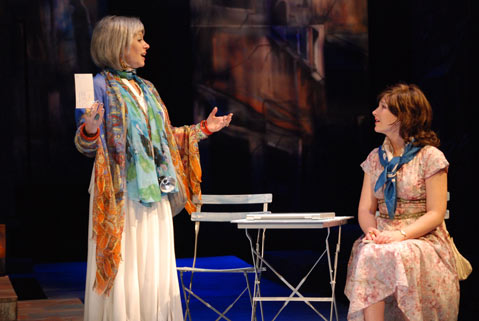Appoggiatura Reviewed
Launch Pad Debut for Playwright James Still

When a person dies, the gap left behind throws those within their emotional inner circle off balance. It’s like a space has opened up in the fabric of life, and those who live adjacent to that empty place then lean across it, and often more fully into each other’s lives. Appoggiatura, the fine and promising new play now in preview performances at UCSB, describes one such moment, once upon a time in Venice, Italy. Aunt Chuck (Irwin Appel) and Helen (Anne E. Torsiglieri) have both, at different times, been the intimate partners of the same recently deceased man. The man’s granddaughter, Sylvie (Sophie Hassett), accompanies them on a combined vacation and reflection trip to that most imaginary of real places.
After a bit of bother over some lost luggage and a blackout at their hotel, the trio, thanks to the ministrations of their “travel guider” Marco (Dominic Olivo) set about their real business in Venice, which is to travel back into the dream worlds where their desires and fears really lie. For Aunt Chuck this means coming to grips with the loss of a man who clearly meant everything to him, and who left a straight life that included a wife and children to become his companion until death. Appel excels as Chuck, wringing both laughs and sighs out of the apparent depths of his character’s powerful grief. In terms of the familial reconfiguration that’s taking place, this character is at once the most outwardly vulnerable and the most central. He may be doing most of the leaning, but perhaps due to the freshness and intensity of his loss, the others tend to revolve around him.
As Helen, Anne Torsiglieri has a great role too, and one well suited to her many talents. She does an exceptionally memorable job with the bit of visual humor involving windows and street musicians that the playwright has invented to open the play, and she is powerful in Helen’s speeches, especially her hilariously arch prayers. As the younger characters Sylvie and Marco, UCSB BFA candidates Sophie Hassett and Dominic Olivo also get a remarkably large number of opportunities to shine, especially when the play moves from the present into the past—or is it the imagination?
Once the setting in Venice and the set-up of the initial situation are both established, the play begins to spin into a series of sequences that represent fanciful versions of the past for Chuck and for Helen. Helen imagines (or does she really see?) her younger self and her dead husband Gordon as honeymooners abroad. She even gets a chance to take their picture with a 1950s style Brownie camera. For Chuck, the guide Marco, who has romantic troubles of his own, triggers a flashback to the moment when he first appealed to Gordon to consider taking him on as his life partner. It’s one of the best scenes in the play, and it demonstrates the most important opportunity for improving what is already a good script. Early on, when Marco is just an enterprising young Italian trying to hustle some American tourists, he serves as both a comic foil and an expository device, two layers that don’t add up to a satisfying whole character. Later, once his life story has become intertwined with that of Sylvie, and that of Chuck, he deepens, softens, and lends a crucial touch of hope to the elegiac proceedings.
As Sylvie and as Helen the younger, Sophie Hassett shows tremendous charm and potential. Her growing self-consciousness, both in the scenes with Helen the elder, and in some very clever and forceful Skypes with her lover Kate (a sharp and witty Sachi Tanaka), gives the play yet another interesting and nuanced emotional dimension. It will be a pleasure to follow the fortunes of this project, which is one of a projected three plays about this group of characters.



